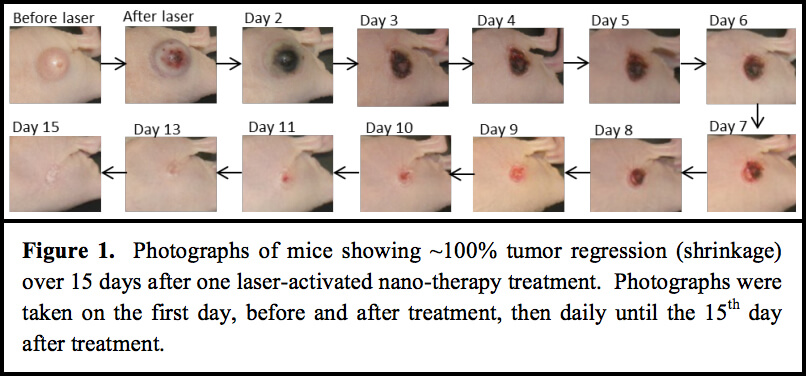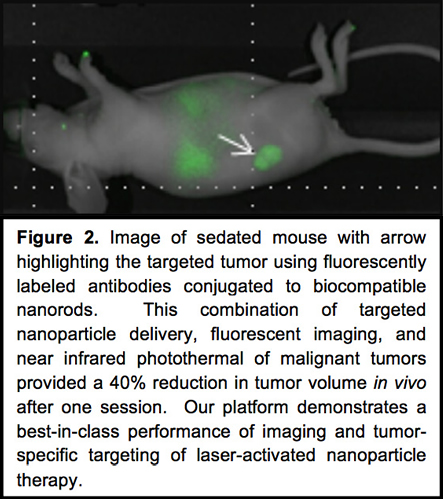
“Shining Light on a Big Problem with a Really Small Solution” Laser-Activated Nano-Therapy of Malignant Tumors:
A Minimally Invasive Multi-Cancer Treatment
The Problem
“Shining Light on a Big Problem with a Really Small Solution” is my favorite way of describing what I am doing. You may wonder what is the big problem? The big problem is cancer. The war against cancer is now one of the longest wars in human history. Too many lives have been devastated as casualties of this war. Even with great strides towards early detection, prevention, and awareness, there is still a great need for improvements to the current cancer therapies of chemotherapy, radiation, and surgery. One major downside of the current therapies is the inability to selectively kill only cancer cells without harming neighboring healthy cells.
The Light & The Small Solution
Using the fundamentals of physics and nanotechnology, I am literally shining laser light on cancerous tumors using a unique liquid solution of really small nanometer-sized particles to selectively kill cancer cells without harming healthy cells. I have developed a treatment platform that has great potential to treat multiple tumor types in a simple outpatient procedure with minimal side effects – laser-activated nano-therapy (LANT).
The LANT treatment platform works by shining a harmless laser light (laser activation) on a cancer tumor that has been injected with non-toxic nanometer-sized particles in solution (nano). The nanosolution absorbs the laser light, converts it into heat, and provides a selective, thermal death for the cancer cells (therapy). Neither the laser nor the nano-solution can cause cell death without the other – they have to work together as a team in order to be effective and kill targeted cancer cells.
The Results
(1) Intratumoral Laser-Activated Nano-Therapy
This best-in-class demonstration of thermal therapy using laser-activated nanoparticles resulted in ~100% tumor regression (shrinkage) after only one 10- minute treatment in comparison to the 3 control groups: no treatment, laser only, and nanorods only. The tumor experienced immediate discoloration after treatment then showed continued tumor regression and healing. A board certified pathologist confirmed that no viable tumor remained after 15 days. This was representative of all of the tumors treated. Photo-Nano-Therapy has the potential to become an ideal treatment for primary tumors, an alternative or supplement treatment to chemotherapy and radiation, and as an outpatient cancer treatment.

*Published in Int J Nanomedicine vol. 9 5093-102. 5 Nov. 2014(2) Fluorescently-Labeled Antibodies and Laser-Activated Nano-Therapy
The innovation of our 3-in-1 combined targeting, imaging, and treatment system enables the combination of tumor receptor site targeting, targeted nanoparticle delivery, fluorescent imaging, and laser-activated nanoparticle therapy that results in marked tumor regression in mice. Our preliminary data demonstrate a best-in-class performance of our findings that fluorescently-labeled antibodies (FLA) add a targeting and imaging component to our novel LANT and induce 40% tumor regression in mice after one 10-minute treatment. Further, the addition of laser-activated nanoparticles to an FDA-approved antibody immunotherapy decreases the time needed to achieve a therapuetic response from weeks to days. This demonstration of adjuvant therapy is promising. FLALANT is expected to serve as a new class of cheaper, faster, and more specific therapy, combining early detection with targeted, selective, and repeatable treatments for a variety of cancers.

Expected Outcome
Within 3-5 years, we plan to demonstrate that photo-nano-therapy is a multi-cancer treatment for a variety of tumors types including breast, colorectal, ovarian, skin, cervical, pancreatic, bladder, and prostate cancers in their native locale as well as metastatic tumors in animal models. Long term, we envision developing medical devices and providing cancer patients with a low cost, outpatient treatment with minimal side effects as an alternative to surgery, chemotherapy, and radiation therapies. With your financial support, we can realize this dream together and translate this treatment from mice to man.
